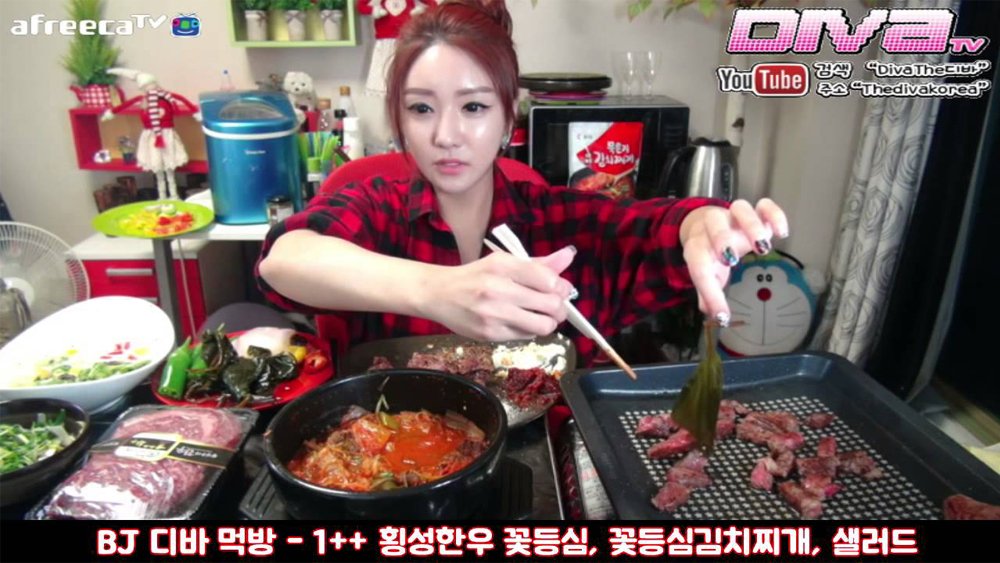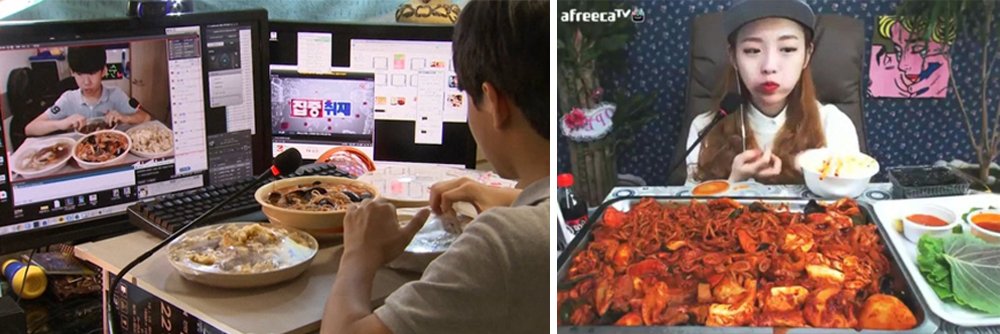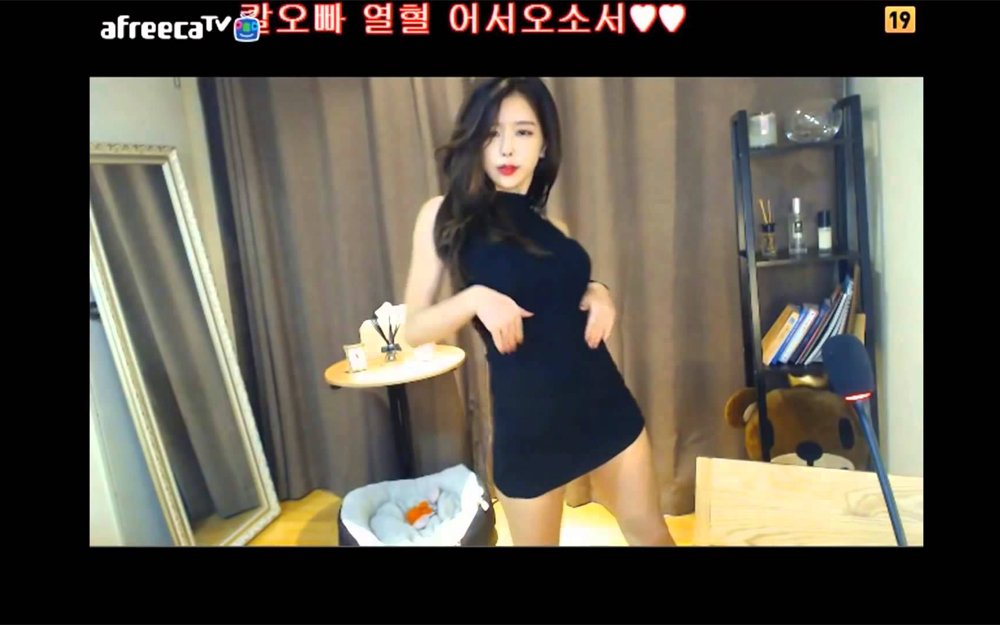Endearing “Food Porn” Culture
Muk-bangs (먹방) or “Eating Broadcasts” have become a mainstay activity in South Korea. If you haven't seen some of the latest Youtube videos or Vice documentary of the phenomenon, to explain it simply: individuals prepare and eat meals on a live-stream as a digital audience converses with them through chat and offers monetary tips. The streams are usually hosted on AfreecaTV, Korea's equivalent of Twitch. Muk-bangs have been around since 2010 and have been increasing in popularity for both aspiring stars (called BJ's or Broadcast Jockeys) and the growing user base.

Highest Grossing Broadcaster: The Diva (디바). Image Source: cyberspaceandtime
So why the craze?
“Room” (방 Bang) Culture is HUGE in Korea- citizens spend a great deal of their time in little rooms all over the city.
There are 2 major reasons for Bangs. The first is that in larger Korean cities, people split up their daily activities into various physical and now digital spaces. “Bang” in this case means broadcast (방송 - bangseong) but the term is also attached to other programs. Norae-bang (노래방) or “song room” is a rentable karaeoke space. PC-bang is a computer hall to play games or browse by the hour. Jjimjilbang (찜질방 - steam room) are communal saunas. Most of Koreans live in dense urban areas, for example almost 50% of the entire country resides in the capital Seoul, in apartments that typically have no more than a small living room, kitchen, and 1 bedroom. Most young people and students live in “one-rooms” which are tiny studio apartments. For much of the population, the home is simply a place to shower and sleep.

Typical Apartment Complex Interior and Development. Image Source: kimchiicecream
Second, more people are living alone. The rate of marriage and childbirth is declining and the traditional lifestyle of living in large households with your family is disappearing. The once social activity of sharing every meal shrinks as a result. What compounds this problem is that it is very difficult to meet new people in Korea as social circles are tightly knit around school friends and work colleagues. If you're an introvert or outside in any way, maintaining social relationships is a great challenge.

Left- BJ Patoo, Right- BJ Hyo-Jjang. Image Source: Terafar, ABC News
This environment has led to rise of stars such as Patoo who is known for being the most successful 14yr-old on the broadcast, making an average of $1,500 per show. Broadcaster Hyo-jjang used to be a translator and now is a full-time Mukbang star. Lawyers, doctors, and many other well-respected professions are restarting their careers, attracted by the opportunity and autonomy of being a broadcaster.
The Opportunity and Societal Failure of the Muk-bang
When I first learned about these types of broadcasts, I was extremely optimistic. Young Koreans are rarely able to pursue a self-driven lifestyle in a country that is extremely conservative, hierarchical, and formulaic in terms of working in an office. I as a Korean-American have witnessed the incredible success stories of people who make a name for themselves through Youtube, Instagram, and Twitch among other more democratic platforms. There was, and still is, great opportunity in diversifying what these hosts offer to the general public and establish a living doing what they love. Muk-bangs can easily translate into other lifestyle activities, DIY tutorials, hobbies, and so on, providing an outlet for creative energy and potential entrepreneurship.
But that diversification has not caught on in a productive direction for many. Many broadcasts have devolved from being rich sources of engagement and content to becoming “on-demand” services that have worrisome implications. Some self-mutilate or self-humiliate on camera, for example being willinging run over by a car, in the desire for tips. Many young girls act alluringly on camera which seems harmless behind a digital barrier but is terrifying when you learn many of them agree to meet high bidders in person, in private. Obscuring prostitution is not uncommon as well (a very common practice in China on Instagram for instance). This all translates to an attitude completely opposite of autonomy- doing whatever substantial bidders demand.

Sample AfreecaTV dancer. Image Source: Youtube

Left - Left- BJ eats Ceiling Light, Right- Young BJ drinks Bleach. Image Source: YTN News, Naver
We see similar developments with platforms such as Twitch or Youtube Streams and every new social media platform experiments with the boundaries of edgy or productive content. I’m super pumped by the idea of new “entrepreneurial” platforms (Steemit included) where it’s incentivized to put out good content. Yet it’s interesting to keep track of how some exploit or are somewhat exploited by these emerging systems. What kind of broadcast do you guys think would do well and do good for the public?
I hope you enjoyed the post! I'm a strong advocate for cultural exchange and as someone of Korean heritage, I am committed in tackling contemporary issues and explaining aspects of the culture. This is really what I believe to be a chance to bring new ideas and perspectives in and out of the country. Please leave any comments and suggestions below, I would love to get your thoughts as I write more on cultural innovation in the future!
PS: For the next post, I’ll be posting my favorite Korean recipe, FIRE CHICKEN.
